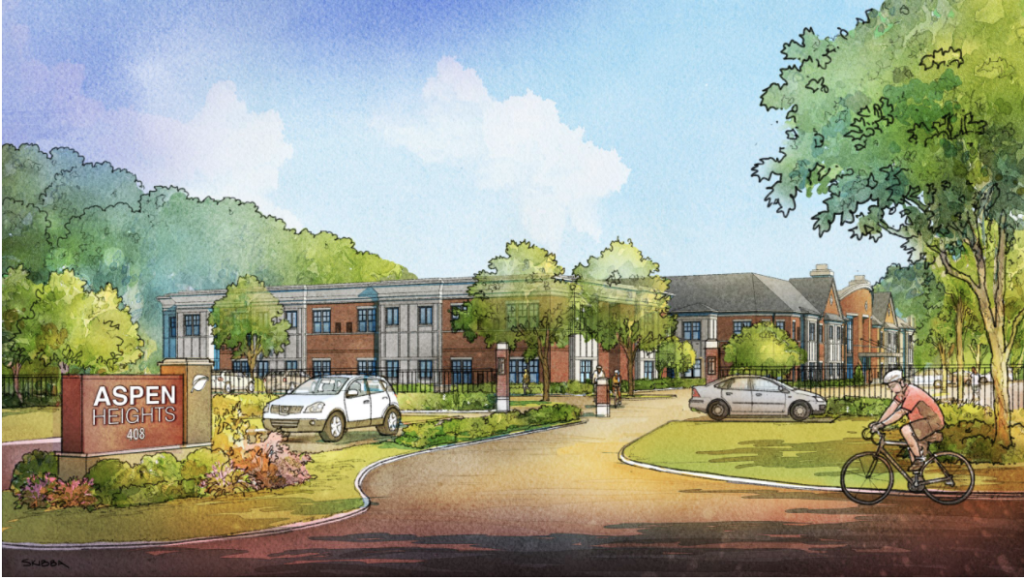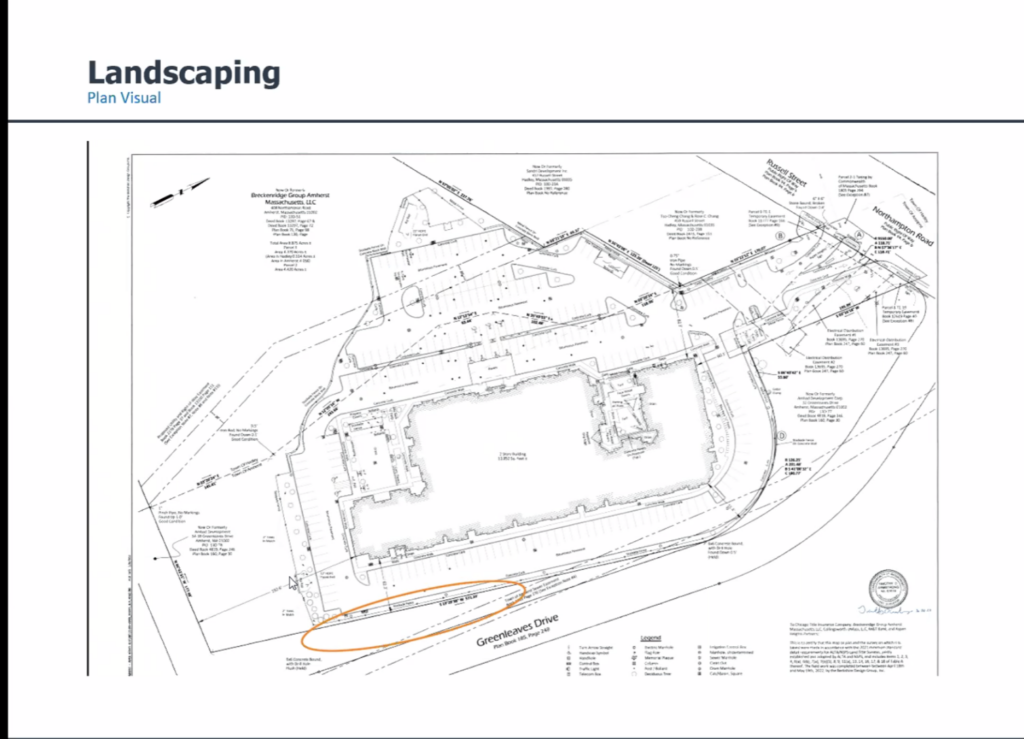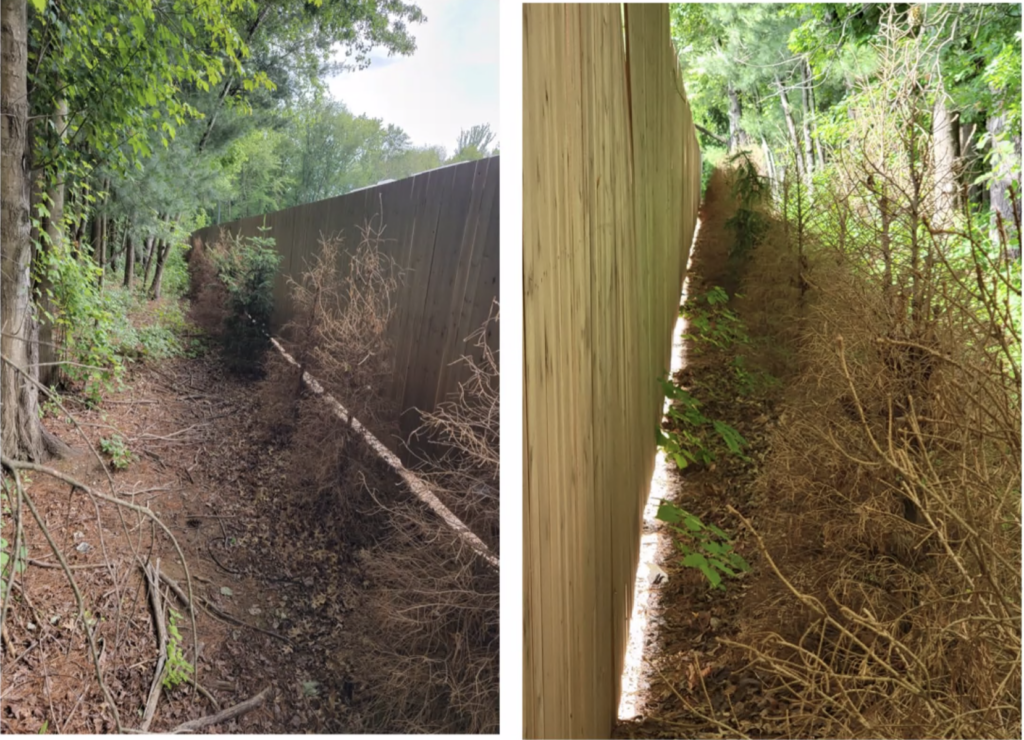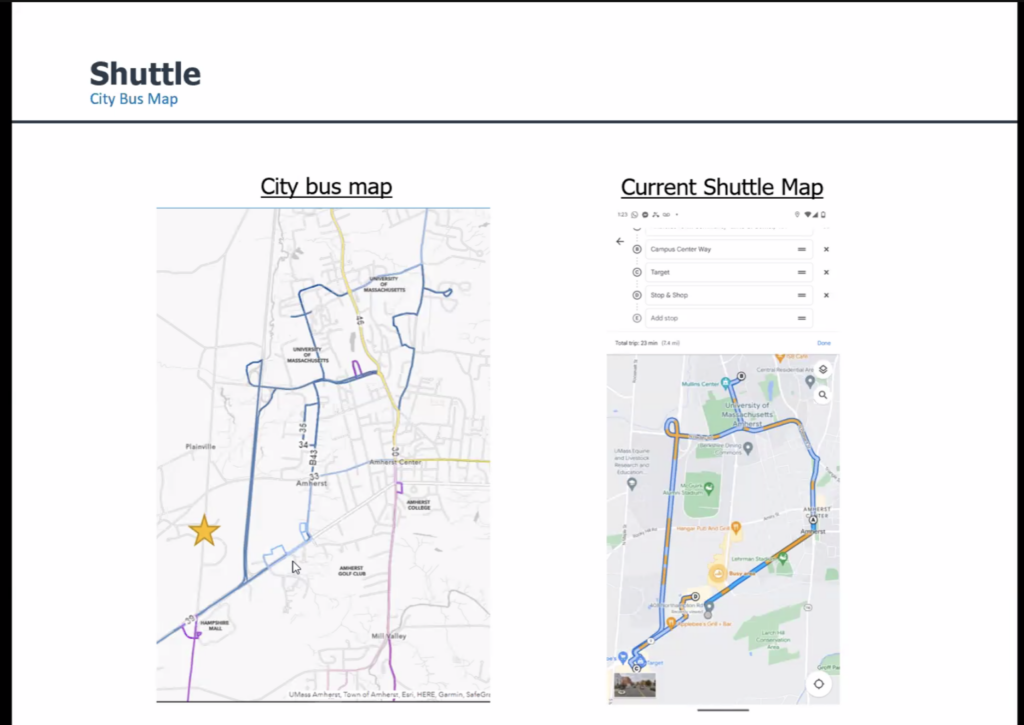Zoning Board Of Appeals Grants Permanent Occupancy Permit With Conditions To Aspen Heights Apartments

Photo:: Architect's rendition of Aspen Heights Apartment Complex. Photo: amherstma.gov
Report On The Meeting Of The Zoning Board Of Appeals, June 22, 2023
This meeting was held over Zoom and was recorded. It can be viewed here.
Present
Steve Judge (Chair), Dillon Maxfield, Craig Meadows, Associate members: Sarah Marshall and David Sloviter. Sarah Marshall, Craig Meadows
Staff: Rob Watchilla (Planner)
For the appellant: Breckinridge Group LLC of Austin Texas: DBA Aspen Heights Residential Community, 408 Northampton Road and Greenleaves Drive, Andrew Jacobs, accompanied by Attorney Ryan
Aspen Heights is a two-story apartment building with 88 rental units, 11 of which are affordable at the 80% area mean income level. Its location is on the west boundary of Amherst on the Hadley line, the site of the former “Amherst Motel” which was converted by Special Permit to 42 rental units in 1968. Thus, the 2017 decision to allow the construction of Aspen Heights, tripling the number of units to 131 was an extension of a non-conforming use.
When the 1964 permit for the Amherst Motel was granted, this area was “semi-rural in character with a few houses on Northampton Road and an apartment complex on abutting land to the east of the motel site.” A substantial area of land surrounding the motel was set off to preserve the open character of the neighborhood, the approximately four-acre site then satisfied the zoning bylaw requirements for a 40-unit apartment building. The decision noted: “Major changes have taken place with the large shopping plaza with two cinemas having been constructed to the north across a busy highway, along with considerable commercial development on the south extending into Hadley.
The 2017 Special Permit for Aspen Heights had 112 conditions. One required a six-foot metal fence, modified in 2019 to eight feet high less than five feet from the property line for effective “aesthetic screening” for the abutters, since the required setback would have put the fence in the drive lane, compromising fire protection.
The number of units in the complex was reduced to 88 in that permit. The current application asks to modify three more of the 112 conditions. The apartments have been occupied for two years under a temporary renewing occupancy permit. A permanent occupancy permit is pending resolution of compliance with the approved landscaping plan.
The landscaping plan (shown below) required planting Siberian Spruce trees along the fence under existing pine trees to be maintained in perpetuity and replaced if they die. The trees died. Andrew Jacobs of Breckinridge Group is asking to remove the dead trees without the obligation to replace them since “the environment is not conducive to tree growth (according to local nurseries) and the outcome will be negative” because the roots of the pine trees and shade compromise the viability of Siberian Spruce trees. The few abutters are not asking for the trees to be replaced.


ZBA associate member David Sloviter noted that the dead spruce trees and dead pine branches constitute a serious fire hazard and should be removed. Jacobs noted that a third party manages landscape maintenance and he will look into their contract.
ZBA Chair Steven Judge asked whether planting some low shrubs or greenery to the west of the pine trees was a possibility. ZBA associate member Sarah Marshall questioned whether the spruce died from shade or inadequate irrigation. Jacobs said he didn’t know the answer because he manages units all over the country for Breckinridge and isn’t aware of the many details of the landscaping of individual properties. Marshall suggested that rhododendrons might work well. ZBA member Craig Meadows noted that any plantings west of the fence could face a worse fate than shade from the snowplows and salt in the roadway.
Next Jacobs asked that the required shuttle service be limited to the UMass academic calendar only, and eliminated during the summer, winter and spring breaks. Jacobs maintains that there are only one to three riders a day for shuttles running every half hour from 7 a.m. to 7 p.m. when class isn’t in session at a cost of $10,000. This service is outsourced to a contractor. Eighty-six per cent of the residents at the complex are students. He noted that the PVTA has a similar route and bike lanes are nearby. Judge asked if the shuttle could be available on a “on-call” basis, but Jacobs replied that this is not an efficient use of the resource, making it more difficult and costly. Seeking a compromise, Maxfield asked about the possibility of a very reduced service of a day or two per week. The Chair and board members kept asking about ridership data during the school year compared to the summer. No data were given, although Judge insists that numbers of riders/day/route is easy to get with the driver’s use of a clicker. Jacobs considers data collection not to be part of the van service contract. He does consider van service an attractive amenity “to attract tenants in a tight market.”

Sloviter countered with, “How about every two hours operated by someone who has another job on the property?” Various other ideas were tossed around to try to find a way to accommodate people without cars during the breaks, particularly the families in the affordable units and tenants not tied to the academic calendar. The fire department had required the bus service on the first permit because tenants were crossing route 9 to the Stop and Shop Plaza mid-block for bus service rather than walking one block to the intersection, a very hazardous situation. Jacobs kept insisting that UMass was the primary destination of its users so that when there is no class, there is no demand, but, he had no ridership data to substantiate his allegation. In support of some compromise Maxfield noted that no other Special Permit has this requirement.
Lastly, Condition #62 required “guest check in” services to be performed by on-site management or security staff and no guest shall be allowed in unless checked by staff or escorted by a student. Jacobs asked to eliminate guest check-in, because it is difficult to comply with and difficult to enforce. Partly because despite key fobs and cameras, guests were entering through the side doors, as opposed to the main entrance where security is located. Therefore, the system is not working as envisioned by the ZBA. Up to five staff members are available during business hours and on-site security is contracted to a third party. Finding the required “live-in” 24-hour security person has been impossible. The owners say that given the 24-hour on-site security presence in the residency requirement is superfluous. Judge agreed and called these 24/7 security measures excessive, more appropriate to a dormitory than an apartment building.
There was only one public comment from abutter Louise Colligan, who, along with her husband had sent a letter to the Board in support of the application. She suggested that the money saved from not running the van might be used for a bus shelter which could also serve the proposed (and permitted Five-College Credit Union) bank next door. She likes the fence but hopes that the owner will clean up all the dangerous debris from fallen limbs.
Members, seeing no need to hold up the granting of a permanent certificate of occupancy, voted unanimously to 1) maintain the area around the fence free of debris and fallen limbs to reduce fire hazard, 2) to reduce the bus schedule by 50% until August 15, 2023 when full normal schedule can be resumed until June 15, 2024. The Board expects to receive ridership data well before a decision can be made to totally eliminate van service when school is not in session. ZBA members were concerned that current tenants who depend on van service would have no notice; however, it was also noted that eliminating the shuttle might slow down rent increases. Since there was a reference to “an emergency,” in the application, the Chair asked for an Incident Report to see if anything “disturbing” had occurred before he signs the Special Permit.
Conditions cited:
49. The applicant shall provide a shuttle from 7:00 AM to 7:00 PM to take residents to and from designated locations within the community, including sites such as downtown Amherst, University of Massachusetts, Amherst College, Hampshire College and downtown Northampton. This service shall be provided year round and at a minimum of five days a week. Shuttle service times, stop locations and regulations shall be posted on site visible to all residents and shall be given to each tenant as part of their welcoming packet. Any reduction or elimination of service shall require the consent of the Zoning Board of Appeals at a public meeting.
77. Landscaping shall be maintained by the property owner in accordance with the Management Plan. Any plantings that die must be replaced during a reasonable time frame as the weather and season permits.
